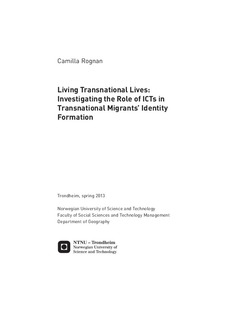| dc.contributor.advisor | Lund, Ragnhild | nb_NO |
| dc.contributor.author | Rognan, Camilla | nb_NO |
| dc.date.accessioned | 2014-12-19T14:26:24Z | |
| dc.date.available | 2014-12-19T14:26:24Z | |
| dc.date.created | 2013-10-10 | nb_NO |
| dc.date.issued | 2013 | nb_NO |
| dc.identifier | 655102 | nb_NO |
| dc.identifier.uri | http://hdl.handle.net/11250/265529 | |
| dc.description.abstract | In a globalized world, the recent developments in information and communication technologies (ICTs) and transportation have facilitated international migration in ways that have led to great increases in this type of migration over the last decades. In the host country migrants are influenced by new cultural impulses that are different from the ones in their homeland. Over time, these may be incorporated into the migrants’ cultural identities and as time passes, the migrants may start to identify with more and more aspects of the host culture, creating a belonging to the new country. By adopting a transnational lens, the objective of this thesis is to examine how transnational migrants’ cultural identity is challenged, negotiated and formed through the use of modern ICTs that allow for frequent communication with homeland relations. This was done by investigating the role of ICTs in the migrants’ practices of ways of being in and ways of belonging to transnational social fields and the research questions that have been discussed and answered are as follows:
1)What is the role of transnational communication networks and technologies in identity formation?
Can gender differences be identified?
2)Can today’s extensive use of information and communication technologies show that migrants maintain more of their ‘old’ identities?
Are identities gendered?
It is found that ICTs play a large role in the identity formation of transnational migrants and that migrants who live transnational lives constantly (re)negotiate and form transnational identities in relation to their respective social fields. In addition, analyses show that ICTs available today facilitate both practices of ways of being (transnational communication) and ways of belonging (identity-conscious practices) in transnational social fields, and may indeed contribute to the maintenance of more of migrants’ ‘old’ identities. The migrants are anchored in both transnational social fields and are rational actors that actively choose what to keep of their old and new identities through a constant (re)negotiation of their identities. Both analyses show that migrants’ identities are gendered and this, in combination with the constant reworking of identities, show that the migrants are reflexive life planners. | nb_NO |
| dc.language | eng | nb_NO |
| dc.publisher | Norges teknisk-naturvitenskapelige universitet, Fakultet for samfunnsvitenskap og teknologiledelse, Geografisk institutt | nb_NO |
| dc.title | Living Transnational Lives: Investigating the Role of ICTs in Transnational Migrants’ Identity Formation | nb_NO |
| dc.type | Master thesis | nb_NO |
| dc.contributor.department | Norges teknisk-naturvitenskapelige universitet, Fakultet for samfunnsvitenskap og teknologiledelse, Geografisk institutt | nb_NO |
